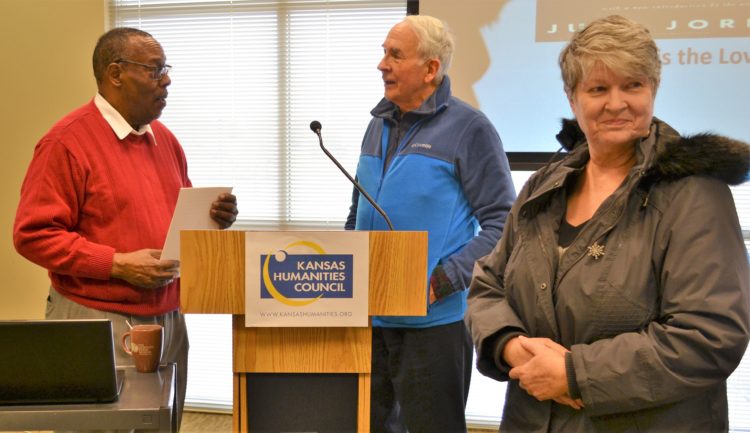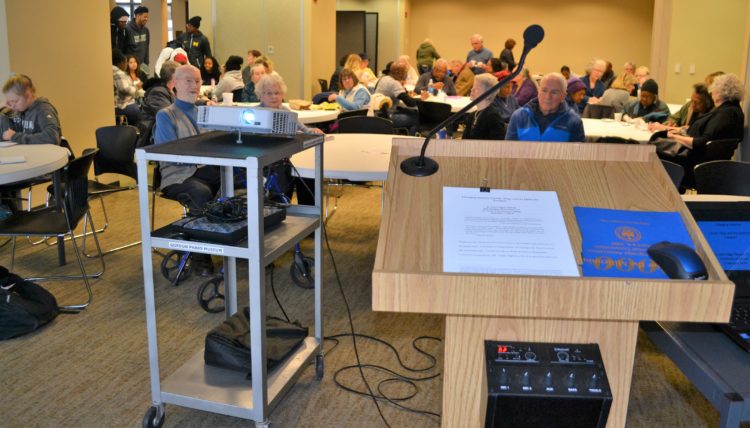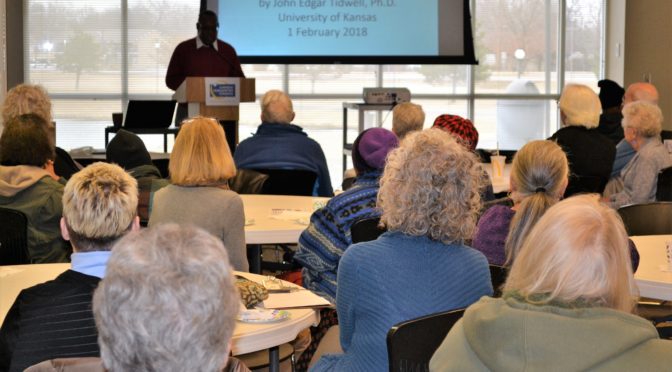
Kansas University Professor John Edgar Tidwell spoke to a room full of people Thursday during the Kansas Humanities Series Lunch and Learn at Fort Scott Community College’s Gordon Park Museum.
The event was in celebration of Black History Month.
Tidwell gave some history on how President Abraham Lincon, with the Emancipation Proclamation in 1863 and Dr. Martin Luther King, in the March On Washington in 1963 helped to change America.
“They led the way to freedom,” Tidwell said.
Although the Emancipation Proclamation did not end slavery in the nation, it captured the hearts and imagination of millions of Americans and fundamentally transformed the character of the war. After January 1, 1863, every advance of federal troops expanded the domain of freedom. Moreover, the Proclamation announced the acceptance of black men into the Union Army and Navy, enabling the liberated to become liberators. By the end of the war, almost 200,000 black soldiers and sailors had fought for the Union and freedom, according to https://www.archives.gov/exhibits/featured-documents/emancipation-proclamation
“There were creed and practice differences,” Tidwell said of American history.
During the March On Washington For Jobs and Freedom on August 28, 1963, Dr. King gave a powerful speech that helped the progress of the Civil Rights Movement.
The most memorable part of the speech was after Mahalia Jackson, the black Gospel singer, shouted out “Tell them about the dream!” Tidwell said.
King then set aside his written speech and spoke spontaneously to the approximately 250,000 people gathered that day.
Jackson was on the platform that day of the march, as a singer.
Here is a clip of that speech:
Black women were at the forefront of the movement, he said, but “they were marginalized and doubly oppressed by racism and sexism”.
Tidwell encouraged the audience to “try to find ways to sustain mutual respect” in the current era of American history.
“Find one thing you see right and work towards that,” he said.
“What can we learn from Lincoln’s struggle with slavery and Dr. King’s efforts to set forth a dream rooted in the American Dream?” Tidwell asked.
“History can be a great teacher. One lesson we can learn is that we are only as free as the respect we show others. In my view, the world we now live in is best described as uncertain.
“No, it is not the world of Dr. King’s separate drinking fountains, segregated classrooms, the real estate practice of red-lining, and other acts of racial discrimination.
“As made clear by the recent outcome of the presidential campaign, our world is beset with an enervating discourse rooted in divisiveness, intolerance, and discord. The moral imperatives of civility, mutual respect, and common sense have been sacrificed to political cant and ethnocentrism.
“The politics of insincerity and expediency have become poor substitutes for compassion and statesmanship.”
“I want people to understand that once they have sympathy and empathy for others, that will translate into an improved engagement with our history, our traditions and all those things that make us, us,” Tidwell said in a later interview. “I want this speech to inspire a little bit for how they can work together on a goal that will enhance everybody’s situation, not just their own”.

